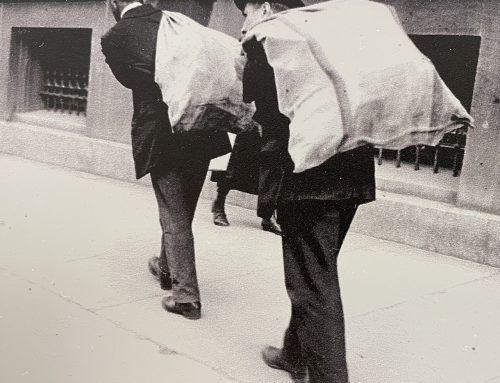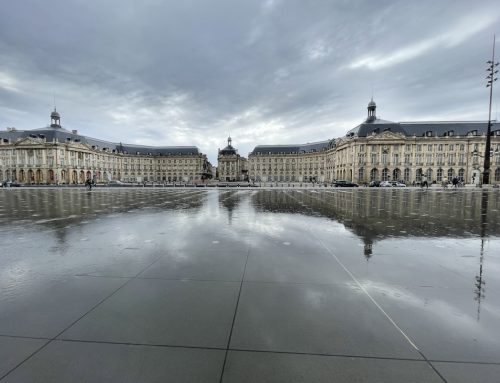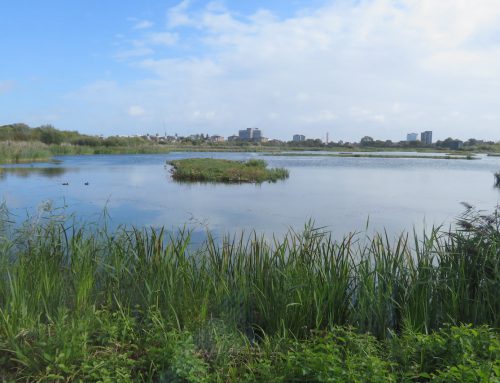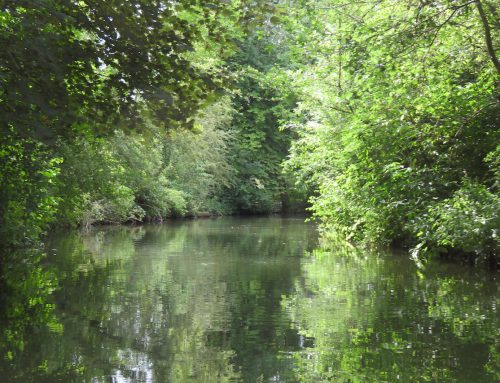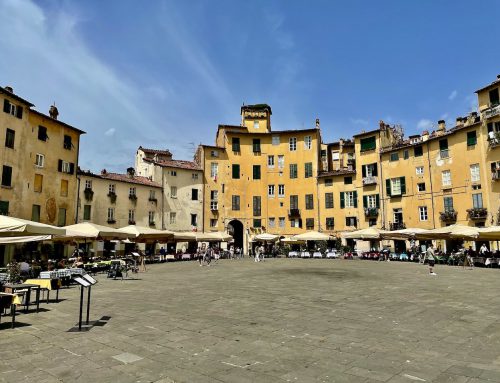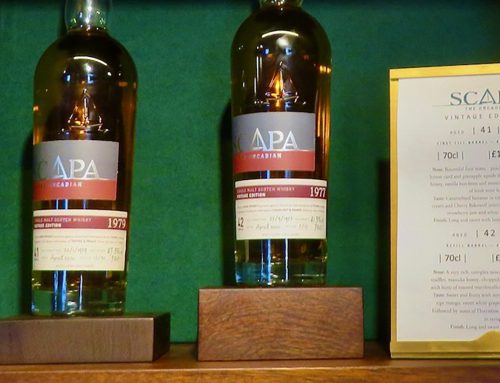Slide-off hotels and the Emperor’s bathroom
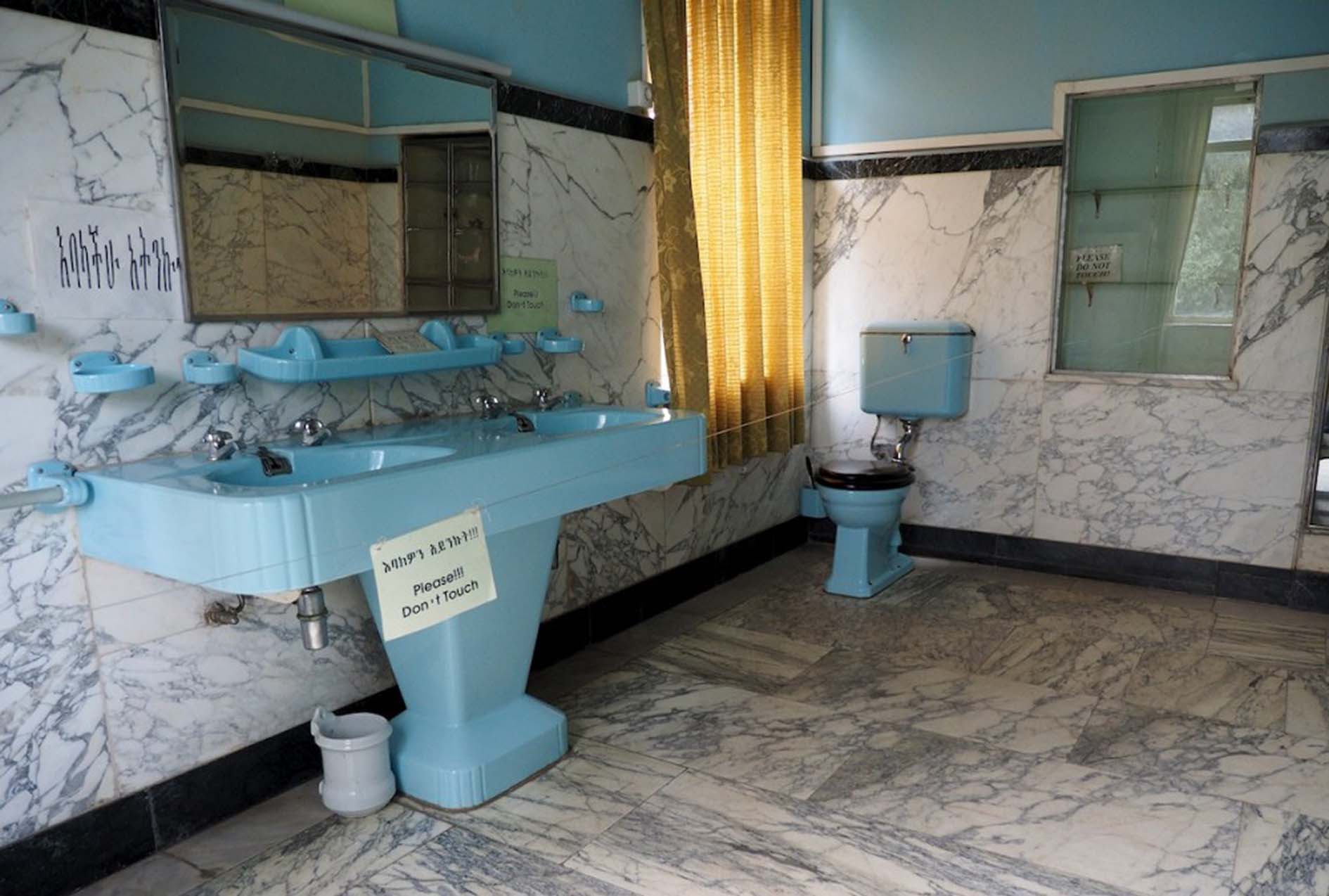
Haile Salassie's bathroom. Not very Imperial to me (www.the-pale-blue-dot.com).

Haile Salassie's bathroom. Not very Imperial to me (www.the-pale-blue-dot.com).
Addis Ababa, Ethiopia
I sense the time is right for a new classification of hotels. Forget one-star, two-star, three-star and beyond. Forget recognition by travel and motoring organisations with the granting of rosettes, badges, pyramids and other art forms. I suggest we start by dividing hotels into one of two categories; those where wet bath soap stays on the bathroom shelf and those where it simply slides off. My hotel today, in the heart of Addis Ababa’s Bole District, is a slide-off not stay-on establishment.
In fact, there are two shelves in my bathroom and the soap slithers from both. I place the bar carefully in its allocated spot. For a moment it stays there, almost hesitating, deciding whether to upset me or not. All it has to do to keep me happy is to stay exactly where it is placed. The soap - it is an oval, pink bar, warped at each end - seems to know when I am looking at it. It stays stock still; it does not even consider shifting. Yet the moment I turn to my right, or left, or turn my back completely, I hear the gentlest “Thud”. The pink bar has fallen and now looks abandoned by its selected plughole - bath or bathroom sink. It looks up at me, helpless, maybe pleading, as if seeking rescue.
The soap is one thing, but everything appears to fall from the shelves in my bathroom. Toothpaste, toothbrush, comb, razor and all those anti-pong gels and lotions that allow us to live in close proximity to our fellow man, or woman should it come to it. Not much hope of that where I am now. Actually I am rather ashamed of myself as I realise I have been away from fair company too long. Only this morning I looked half longingly at the bottled water in my refrigerator. To my deprived eye the bottle looked to be shaped as the perfect female form. Well rounded top half, a thin waist for gripping and a broad and rounded base for the hips. The name on the bottle’s label was “Yes”. I am uncertain if the bottle’s designer had the lonely male in mind when fashioning the final shape. Yet when bottled water has sex appeal, as it does for me right now, it is definitely time to head homewards.
Bathrooms are personal places. As humans we spend far too long in them but they can also look unfriendly, cold and uninviting. They need a little use to become welcoming. It does not matter who you are, how important, how unimportant, how pompous, how humble. The bathroom is where you return to Nature, you stand their naked and undertake all those activities that you would prefer not to publicise to your world, your friends, your family and the rest of mankind. You keep them to yourself. Today I actually visited Haile Salassie’s bathroom although I did not see a single bar of soap.
Haile Salassie was Ethiopia’s final Emperor before being allegedly - I had better say that - bumped off by his successor in 1975, if you can call being usurped in a coup as a valid succession. He was widely popular and his name remains so even to this day. Some say he died of old age, while others suggest he might have been smothered, at the noble age of 83. I imagine he would not have put up too much of a fight, poor chap, as in addition to being elderly he was all of 1.57 metres tall. But his bathroom was disappointing. There was a small, light blue bath, a chrome-coloured shower above, a double basin and a loo confined to a far corner. And that was it. His wife’s bathroom was seemingly a mile away, down tortuous corridors and was even sadder than her husband’s. It was white, plain, unadorned and cold; actually it was ice-cold. I looked around for the central heating. Forget it, there was none. We have it so cushy these days. I imagined maids scurrying around with hot coals, fires ablaze in the only occasional fireplace, but I have not the least idea how the Salassies kept warm.
The expedition to the Empress’ bathroom went past a long line of full-length cupboards where one imagines the latest dresses from around the world were hung. I wonder if the Empress, Empress Menen Asfaw, ever turned to the Emperor to claim that she had no dress appropriate for the next stately occasion, while standing beside at least 50 of the things? Heaven knows what she might have said about her shoes. But my real disappointment during my visit to this, the once Imperial Palace, was the bedroom. The bed was at best King-size; it was certainly not Imperial.
One feature the old Palace, now the Ethnological Museum, did not have - and that pleased me greatly - was canned music. Oh dear. How I am beginning to staunchly support that organisation which is trying to outlaw the stuff. Each morning, as I munch through my African banana cake, African banana, African oatmeal and African overspiced omelette, I do so in the company of the loudest canned music imaginable. The restaurant staff appear to need it to ease their day. I can do without it to ease mine. A covert battle has developed where I ask the waiter to bring some coffee and the moment he leaves the room I make a dash for the volume control. The staff have not yet worked out that I know where it is. It is that small button-like thing hiding in the shadows between the credit card machine and telephone. A quick rotation clockwise and down the volume goes.
To see the waiter’s face when he returns, my coffee on a tray held high, is worth every moment. “What? How? Who?” I can see him think.
I remain silent, wickedly innocent, while enjoying the silence of a restaurant that is free of surplus sound. Anyway, the music is Western, right out of the mid-West United States, is not particularly tuneful, and has nothing to do with Ethiopia. The last thing I wish to do is to be forced to tap my foot while munching.
Breakfast, like the bathroom, is a personal time of day, where you should be left undisturbed if possible. Canned music? Leave that to railway stations, airports, maybe shopping centres and occasional stadia. Actually, maybe it would be better to leave canned music aside completely. It has no place as an accompaniment to an Ethiopian breakfast and certainly no place in an Ethiopian bathroom.
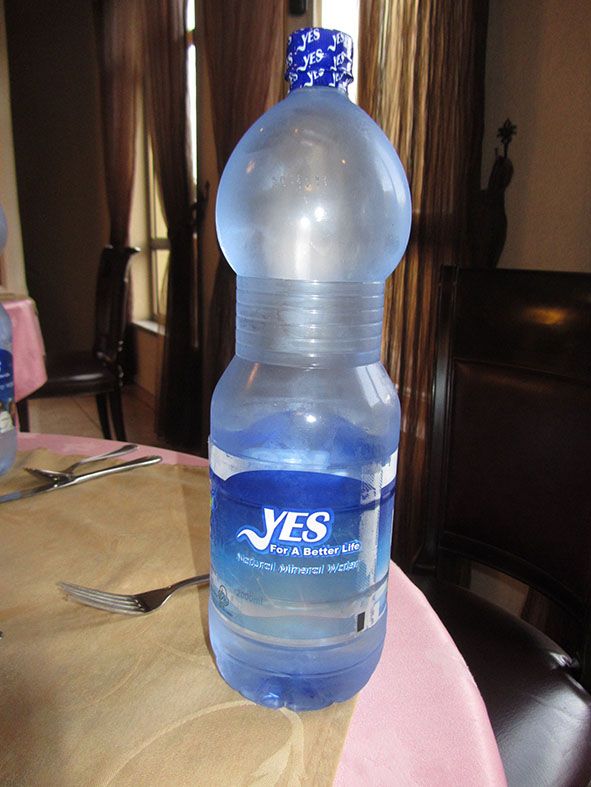
Bottled water with sex appeal. It is time to head for home.
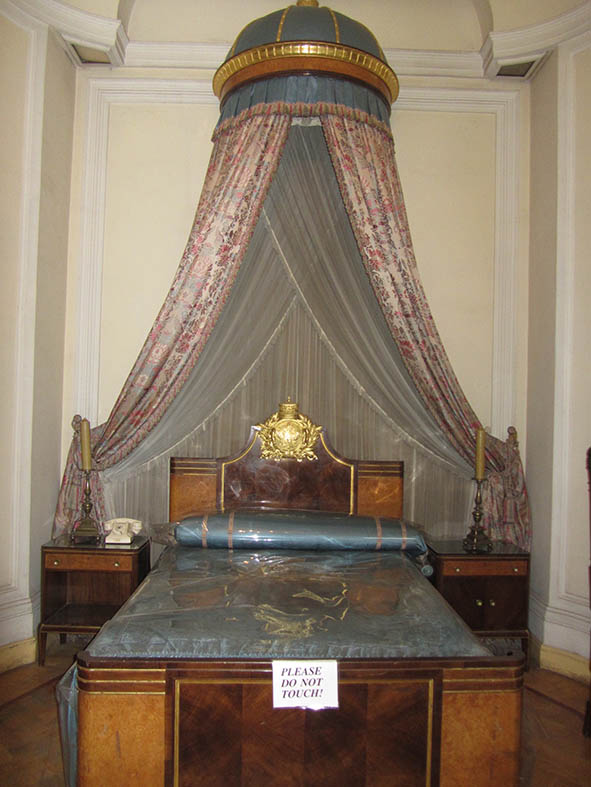
There were two in the bed and the little one said Roll over. Maybe big in its time but definitely not an Emperor width today.

